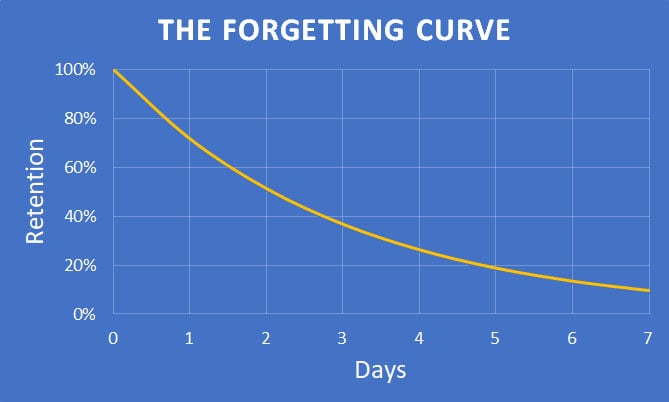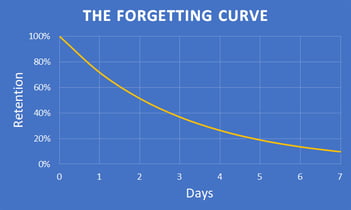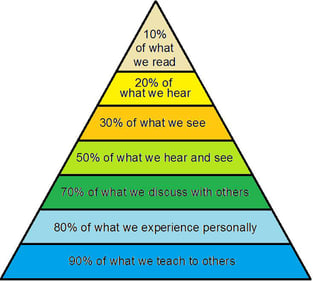
Forgetting is common for most people. We take a training class or study some new material and before 48 hours have passed, we remember only 20% of what we have been taught.
While there are several points of view as to why this happens, one thing is clear- it is a common occurrence among all people. IQ doesn't matter. How hard we concentrate doesn't matter. We all forget. So, I say to myself, why bother? Organizations spend millions on Training and Development, but if, after a week, only 10% of that content is remembered, we aren't really making much progress.
When I share this with clients, I'm frequently asked, "Well, Kim, what am I to do? How do we keep our competitive edge? How do we get ahead of where we were yesterday? My people need to learn!!"

So, before I answer this burning question, lets review Ebbinghaus's Forgetting Curve. The Forgetting Curve demonstrates the decline of memory retention in time. Wikipedia states that according to Ebbinghaus, a typical graph of the forgetting curve purports to show that humans tend to halve their memory of newly learned knowledge in a matter of days. You can see in the graph that after the first week, little is remembered of what was taught.

Edgar Dale shared a similar philosophy. As you can see from his Cone of Experience, we retain only 10% of what we read, 20% of what we hear but 70% of what we discuss with others. Clearly, discussing with others is the quickest way to learn for most people.
So, back to my Client's question. Edgar Dale's Cone of Experience provides a framework to follow. If sharing with others allows us to retain 70% of what we discuss, then the obvious answer to the question is to start or scale a purpose-based mentoring program to achieve learning objectives. Mentoring is a natural fit because it allows us to apply what we have learned because we understand it better, creating for our company a better outlook for the bottom line.
To further support the value of mentoring, check out the last line of the Cone of Experience. Through it, we can understand why Mentors become more and more competent as they share what they know. 90% of what we share with others is retained in the learning process.
To Close- The case is established for mentoring. This research leads us to the conclusion that a robust mentoring program should be the primary expenditure in developing a strong foundation for knowledge acquisition and learning. Aren't we all happier when we grow in competency and knowledge?
Want to know more? Click here to find out how your organization can benefit from mentoring.